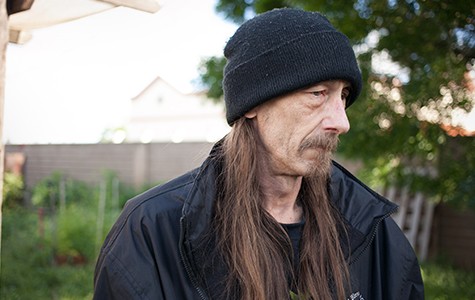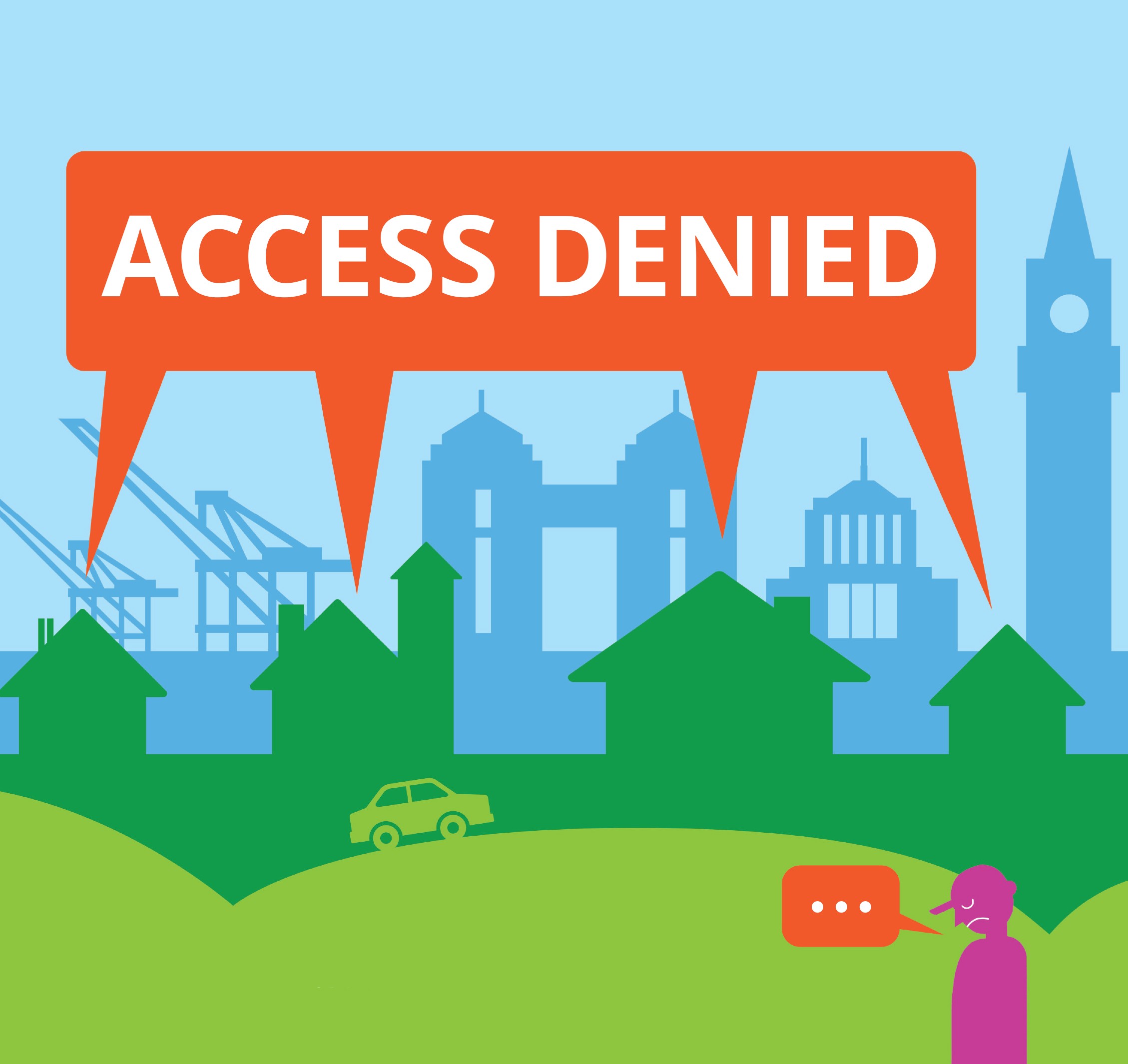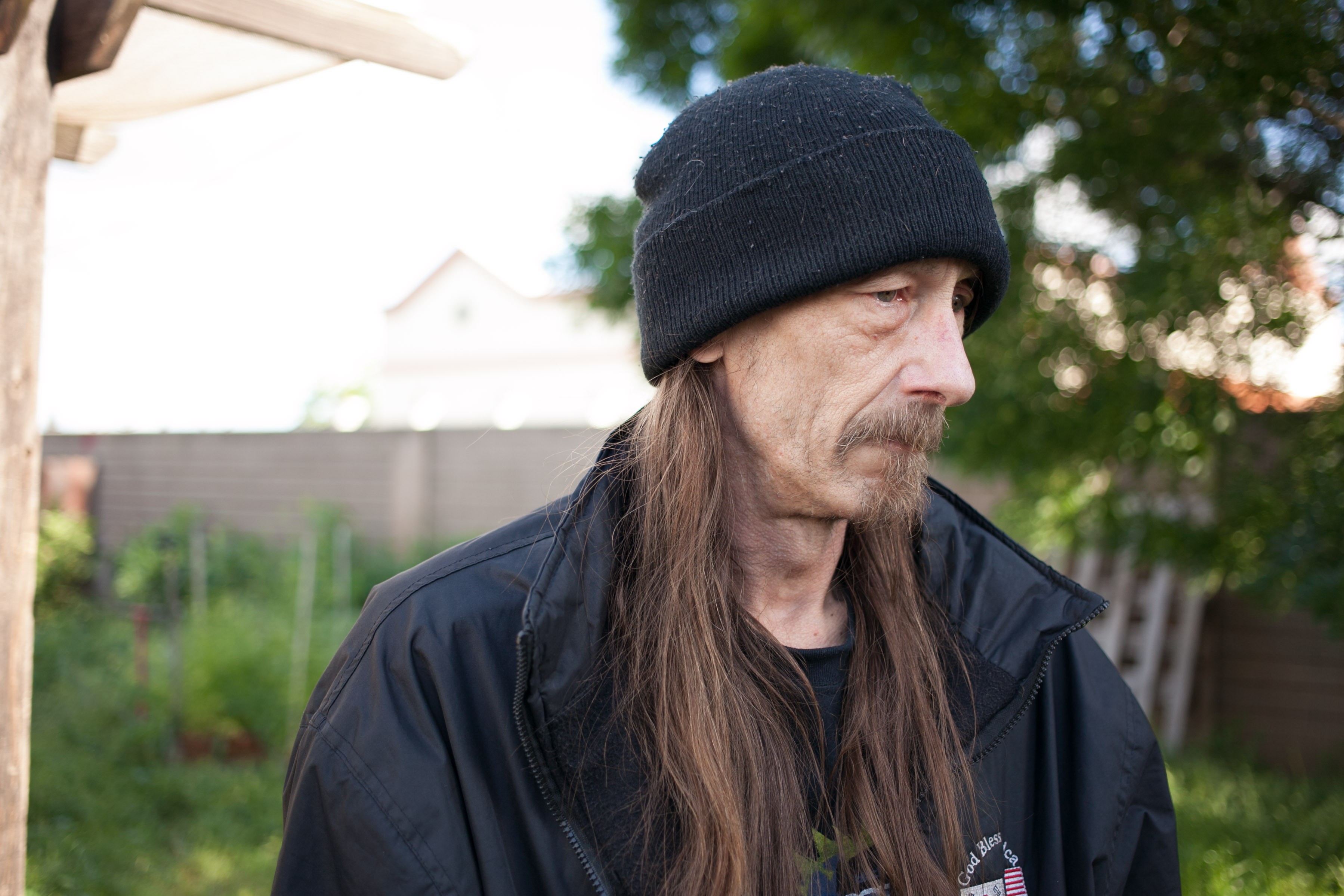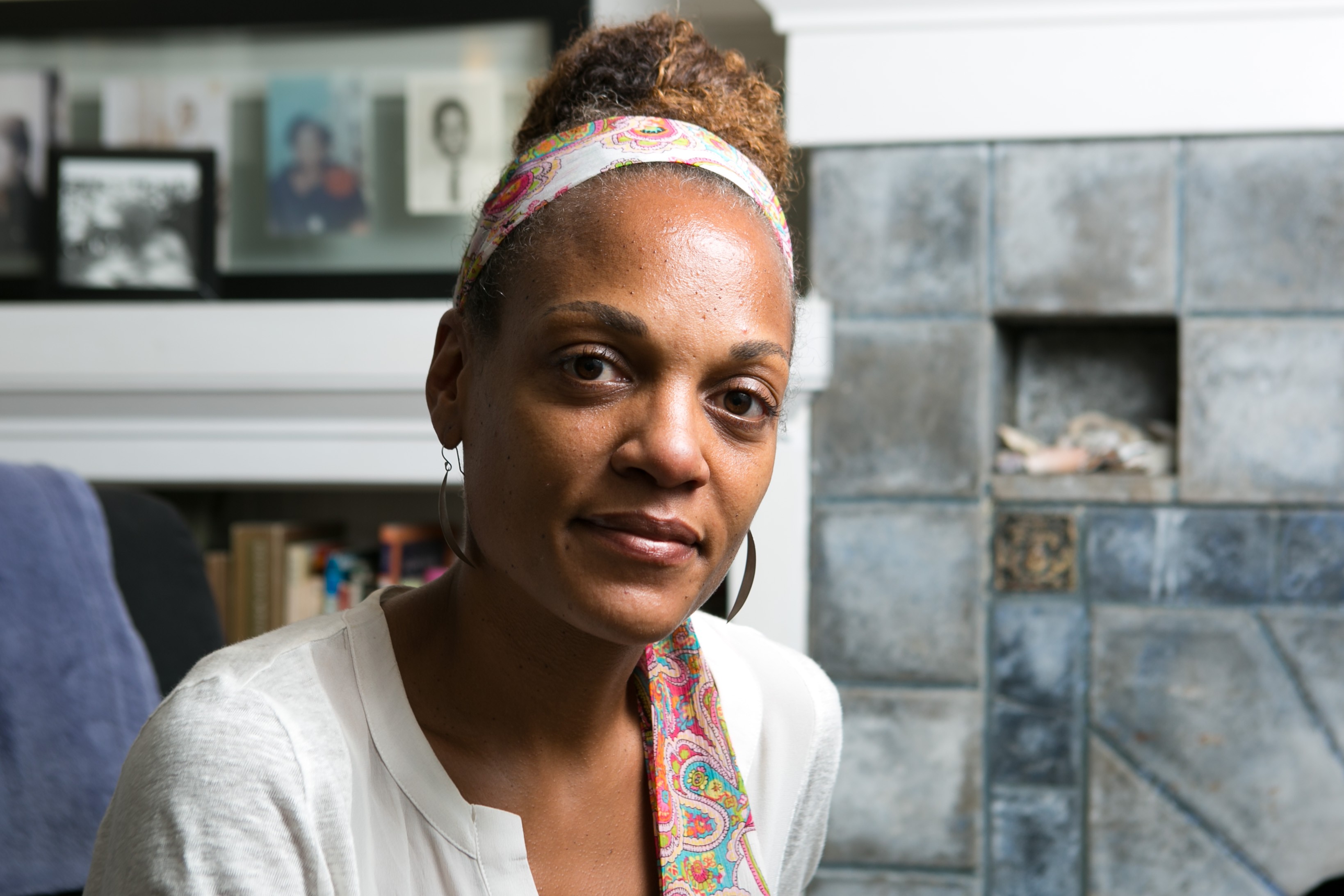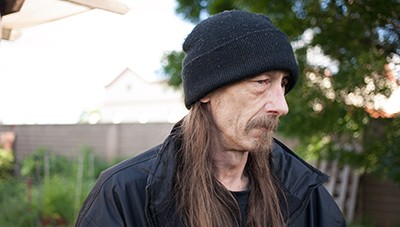As the evening of April 11 approached, Mike Zint prepared for the night as he always did — wide awake and stationed in front of the Berkeley Post Office, where he held the night watch shift for a group of protesters who had been camping out in front of the building for over seventeen months. Early the next morning, however, he received an unexpected visit from Berkeley police.
“They raided at 5 a.m. They gave us no time,” Zint wrote to the Express in an email. “They dragged me down the sidewalk because I was physically unable to walk. They took all the gear including medicines.”


Credits: Illustration by Roxanne Pasibe 
Mike Zint joined Nextdoor to respond to critics of the homeless, but his account was removed. Credits: Bert Johnson 
Shikira Porter said Nextdoor has done a lot to address racial profiling on the site since last year. Credits: Bert Johnson 
Berkeley Councilmember Kriss Worthington said Nextdoor reached out to him for ideas to make the web site more accessible for the homeless. Credits: Bert Johnson 
Zint, who said he has since been forced to move to Shattuck Avenue, is no stranger when it comes to the push and pull that the police and many housed community members exert on homeless people. Alongside activists from First They Came for the Homeless and Berkeley Post Office Defenders, Zint had been occupying the space outside the downtown Berkeley Post Office since November 2014, after the United States Postal Service attempted to sell the historic building located at 2000 Allston Way. He was also one of the lead organizers for the occupation protest outside Berkeley’s old city hall last year after the city approved a set of strict laws targeting homeless people, including a rule that a person’s belongings can’t take up more than four square feet of space on the sidewalk.
Zint is a well-known figure in Berkeley due to his outspokenness on issues of homelessness and human rights. He hardly ever shies away from a debate about how to best address the problem of homelessness. But recently, discussions involving him and the broader homeless population in Berkeley have taken to the internet via the powerful and growing community networks hosted by the company Nextdoor. So when Zint heard his name was being dropped on Berkeley Nextdoor neighborhood groups, he decided to make a profile himself to see what people were saying, and to join the conversation.
“I started the Nextdoor account because some of my supporters said a group of people were conspiring against the protest,” Zint told the Express in an email, referring to the post office and city hall actions.
Sure enough, after creating an account and logging on, Zint found his name scattered throughout posts made by Nextdoor users from neighborhoods such as McGee-Spaulding and South Berkeley. “I was accused of drug use, theft, and being a criminal,” Zint said. “I was mentioned by name, and most of what was being said was lies.”
Since its launch four-and-a-half years ago, Nextdoor has surged in popularity as a way for neighbors to connect. It’s grown from only 200 neighborhoods to 97,000. Nearly 60 percent of US neighborhoods have a Nextdoor group, and in Berkeley every recognized neighborhood has a Nextdoor group, according to Nextdoor spokesperson Kelsey Grady.
As a one-stop shop for easy, neighborly communication, the website’s booming popularity comes as little surprise. It allows people living near one another to connect online for a variety of things, including posting items for sale, organizing a street beautification day, or talking local politics. Nextdoor groups have also become a place for neighbors to report suspicious activity and crime — a feature that critics say has led to many alarming racial profiling incidents (See “Racial Profiling via Nextdoor.com,” Feature, 10/07/2015). However, after being approached by activists upset with the way innocent Black neighbors were increasingly targeted on the website’s “Crime & Safety” page, Nextdoor staff listened and has since made some major changes to its crime reporting form.
Still, despite its ongoing efforts to prevent racial profiling by its members, Nextdoor has another problem in the East Bay: Some of its users are taking to the website to advocate against homeless people and demand that the police respond when homeless people are seen in their neighborhoods. Like the online allegations made concerning Zint, many other homeless people are targeted by Nextdoor users, often in disturbing and harmful ways.
“Homeless people will be referred to as packs of youth. If they have a bicycle, they are accused of being part of a chop shop, accused of stealing bikes and selling them,” said Barbara Brust, founder of Consider The Homeless!, a Berkeley-based human rights group. “I’ve seen quotes where [Nextdoor users claim] 80 percent of the people have drug and alcohol problems, which is a totally false statistic.”
But homeless people face another problem. Homeless people like Zint aren’t given the chance to speak up for themselves on the website due to Nextdoor’s policy that you must have a home mailing address that isn’t a PO Box in order to use their service.
“Nextdoor kicked me off because they found out I’m a homeless man,” Zint said.
At first look, Nextdoor’s policy requiring that members join using the street address of their home, rather than a PO Box or other mailing address, seems to make sense, as it ensures that only actual residents of a neighborhood can access the group and join the discussion.
“From my point of view, if you’re trying to have a neighborhood-based thing and you allow any person come through and say yes, use this PO box, then everyone could sign up and spew their agenda,” said Berkeley Councilmember Kriss Worthington. “If it’s supposed to be about community neighborhood empowerment, you don’t want some political campaign or company sending out advertising to the neighborhood list.”
As a private online social network for neighbors, Nextdoor allows users to post about a free chicken coop they want to get rid of, a dog they might have lost, a safety issue such as a recent robbery, or to refer one another to auto mechanics, among an almost infinite list of useful notices. It’s also increasingly become a place for residents of Berkeley to discuss local politics and put pressure on city officials. In fact, some city councilmembers have used Nextdoor forums to communicate with their constituents. Nextdoor attempts to provide all these opportunities on a safe, closed platform that is exclusive to neighbors within a geographically bounded area.
Zint even thinks it’s a good idea, were it not for the way that anti-homeless invectives have been allowed to proliferate on the site. “It’s a small group of bashers, not the whole Nextdoor community,” he said.
But among the reams of praise Nextdoor has gotten for helping neighbors connect, the website has also faced some serious challenges. As the Express reported last October, white Oakland residents were frequently using Nextdoor to report “suspicious activity” that was in fact nothing more than their Black neighbors strolling down the street, or responding to offers of free lemons from another neighbor’s citrus tree. “Criminal suspects” identified and described by Nextdoor users were often innocent Black neighbors being reported for activities as simple as driving a car. After reading again and again these “alerts” from their neighbors, many families of color began to feel unsafe in their own neighborhoods.
“What we have seen is Black bodies in white space is what’s alarming, and that’s what was in the [crime report] text,” said Shikira Porter, a member of Neighbors for Racial Justice (N4RJ), an Oakland group that came together to educate their neighbors and Nextdoor about the harm being done via racial profiling on the site.
Following the Express’ story last year, Nextdoor staff agreed to meet and work with N4RJ, Oakland Vice Mayor Annie Campbell Washington, Oakland Councilmember Desley Brooks, and 100 Black Men of the Bay Area to tackle the problem head-on. Though the process has been turbulent, many of those that the Express spoke to said Nextdoor has made positive strides in addressing its racial profiling problem.
“I have to say, Nextdoor really stepped up to listen to the people who felt victimized on the site and offered a buffer for those people,” said Campbell Washington. “Now, they are actually changing the way their platform works to address this critical issue.”
“In the beginning phase of our working relationship, I was not convinced Nextdoor fully grasped the critical and immediate attention this needed,” said Porter. “Now, five months later, I believe Nextdoor understands their stake in developing a system that drastically reduces racial profiling posts.”
On April 12, nearly seven months after Nextdoor CEO Nirav Tolia announced changes would be made in response to racial profiling incidents, the website issued a new Crime & Safety report form. Since its release, Porter and others have said that the new form — which now requires users to describe suspects by listing more detailed attributes such as hair type, clothing, shoes, and sex, in addition to race — is a step in the right direction.
“But it’s still a test form,” Porter said in a recent interview. “I’m hoping that Nextdoor keeps their promise and we will come back to this if it turns out there are some blind spots or areas we need to tighten up.”
But while Porter and other advocates work to reduce racially biased crime reporting on Nextdoor, homeless community members like Zint feel they’re still being attacked and slandered on Nextdoor groups simply because they’re homeless — and they can’t fight back. Because the website requires a verified address in order to make an account, homeless community members are excluded from signing up, or as in Zint’s case, they are kicked off for not having a “home.”
According to Jennifer Friedenbach, executive director at the Coalition on Homelessness, Nextdoor’s policy of limiting access to only those with a verifiable home limits people of color the most because the homeless population is disproportionately made up of people of color. For example, Friedenbach said in nearby San Francisco, Black people make up one-third to one-half of the homeless population, while comprising less than 5 percent of the city’s overall population.
After the start of the Berkeley Post Office protest in November 2014, Zint said a letter carrier helped him and other occupiers create a legal mailing address at 2000 ½ Allston Way, which is virtually the same as the Berkeley Post Office. The trick to establishing the address, Zint said, was as simple as mailing themselves a letter to their location in front of the post office, where they had set up their own mailbox. “Once you have a piece of mail with a canceled stamp, the barcode on the bottom, and the address, you have a mailing address,” Zint said. “This was verified as real by other postal employees.” And because Zint was living at the post office, he considered it his home address.
Though not attached to a physical roof, Zint used this address to make his account on Nextdoor after friends and supporters, who were already members, told him he was the subject of posts. But shortly after signing up, and after responding twice to comments made about him and the Berkeley homeless community, Zint said Nextdoor deactivated his account.
“A few members on Nextdoor have been using this site to promote hatred of homeless people,” said Zint. “No homeless person is allowed to respond. … They insist I cannot be a member.”
According to Zint, the reason Nextdoor told him they removed his account was that he had “no verifiable address.” But to him, the company’s excuse didn’t add up. “That argument doesn’t work because I returned a card verifying my address as a condition of membership,” Zint said, referring to a postcard the company mailed to the 2000½ Alston Way address, which Zint received, filled out, and mailed back.
Zint thinks there was a more political reason for his being kicked off the site. “I was removed because I am a homeless man defending homeless people in their forum,” he said.
In an email, Zint told the Express that Nextdoor informed him that a neighbor outed him, telling the company that Zint had not provided his “real” address when he signed up for the service, and also that one of Zint’s messages violated Nextdoor’s guidelines for “neighborly behavior” because he used the word “fascism” in response to an earlier post about homeless people. But Zint said his comment was in response to a series of personal attacks, both on him and the broader homeless community, and he feels that he had a right to defend himself.
“I was personally attacked,” Zint said. “I don’t drink, do drugs, or have a criminal record. I haven’t even gotten a ticket since 1993, but this group wants to depict homeless people in a certain way in an effort to get rid of them. That means, some elitists have a forum for hate, and the poor have no chance to defend themselves.”
Zint is not the only homeless person frequently discussed on Berkeley’s downtown Nextdoor groups. He is, however, the only one regularly mentioned by name. In dozens of discussion threads from Berkeley Nextdoor groups, many homeless people are summarily categorized as criminals and described using questionable and often outright incorrect statistics. Many debates on Nextdoor about homeless people revolve around what to do about Berkeley’s homeless problem, but the debates rarely include input from homeless community members themselves.
“On Nextdoor, there is a small number of people who will, whenever given the chance, publicly rehearse what I would call hate speech against homeless people,” said Thomas Lord, a Berkeley resident who is a member of the SW Berkeley-San Pablo Park neighborhood Nextdoor group. Lord said most of the comments directed at homeless people are often based on no direct knowledge with specific homeless people and their circumstances. Nextdoor users tend to portray all homeless people as drug addicts who have made a “lifestyle choice,” said Lord, and that the attitude of many Nextdoor users is that homeless people “shouldn’t be tolerated, that they are threatening and unhygienic.”
For example, one member from the McGee-Spaulding neighborhood Nextdoor group wrote in a post that bike parts being used by homeless people in Berkeley’s Civic Center Park were “obviously stolen.” The same commenter continued, writing that “In actual studies, roughly 80% of the homeless are found to be psychotic, addicted to hard drugs (including alcohol), or both. … These people need drying out, medical care, an unusually good shrink, & (if they have any brains left) vocational training, not prison, but in the meantime, that doesn’t mean we should apologize for or enable criminal behavior by those who choose it.”
Another Berkeley Nextdoor forum had community members involved in a back-and-forth over a “little old Asian lady” who was allegedly stealing cans and bottles from residents’ trash and recycle bins, with most of the comments criticizing the woman.
“The little old Asian lady (I think there are at least two, actually) in the Poet’s Corner neck of the woods who steals everyone’s cash-redeemable recyclables makes it clear, when engaged, that she doesn’t speak English; kinda damps the prospects for useful communication,” a commenter from the Nextdoor Poet’s Corner neighborhood group wrote. “My bet is that she does speak English well enough and that it’s part of the scam to pretend otherwise.”
Rachel Cole-Jansen, a case manager at the homeless services organization Operation Dignity, said the conversations on Nextdoor are usually not constructive. For her, though, the lack of attention to reducing homelessness is even more striking. “The communication [on Nextdoor] about homeless people is complaints about behavioral issues. A lot of these are somewhat understandable complaints, but none of that energy is going to outreach on site, or substance abuse programs, or more affordable housing… or what’s causing homelessness in the first place,” Cole-Jansen said. “And homeless people aren’t having a voice in these discussions either.”
Since Zint’s account was removed, several community members like Brust, as well as Jai Jai Noire and Elisa Cooper, all Berkeley residents with Nextdoor accounts, have tried to offer online support and speak up for homeless people. But they said they have experienced a harsh backlash as a result.
“We’ve got people saying there’s suspicious activity, someone was going through my dumpster, call the police. That was just someone looking for cans!” said Brust, who is a member of the North Berkeley Nextdoor group. “But when I call them out on it, I am put down, patronized, and basically discredited.”
Brust, who works with homeless people several nights a week, said she tried contacting Nextdoor about how homeless people are talked about on the site, but she did not receive a response. She and several others also told me that their posts defending homeless people, and pushing back against what they perceive as discriminatory comments, have been flagged and sometimes deleted by website monitors, typically members of a Nextdoor group who are designated by Nextdoor employees as “leads” and given the power to delete messages they deem inappropriate. Leads also have the power to report group members’ addresses for possible removal.
“Seeing this was the first time I ever considered leaving Berkeley,” said Noire, who is a member of the McGee-Spaulding neighborhood, about the tenor of conversations on her Nextdoor group. “We live in a very compartmentalized society, and on Nextdoor this is all coming out.”
The conversation got even uglier when leads from the downtown Berkeley neighborhoods began chiming in that homeless people do not deserve a place on the website to advocate for themselves.
“Nextdoor’s organizing principle is ‘neighborhood’ with address of residence as the key piece of information,” former McGee-Spaulding Nextdoor lead Eric Friedman wrote in an email. “The post office is not Zint’s address, and they specifically exclude PO Boxes from consideration for residency.”
Posts from the McGee-Spaulding neighborhood Nextdoor group showed that Friedman had reported to Nextdoor staff that Zint was not actually residing at the post office address he used to obtain a Nextdoor membership. Friedman wrote to Nextdoor, “that [Zint’s] enrollment should be reviewed accordingly.” When asked to comment about this, however, Friedman — who said he recently resigned from his position as a lead after receiving a number of threatening messages —told the Express he did not recall reporting Zint’s account to Nextdoor for removal. Friedman declined to identify who threatened him.
“There are plenty of other [online] platforms available to Mike Zint,” Friedman said. “He has made a lot of life choices that made him do what he is doing. If he wants to pursue employment or join the mainstream, he could find housing and join Nextdoor.”
Although Nextdoor declined to discuss the circumstances surrounding the deletion of Zint’s account, company representatives did say that “if an individual does not receive mail at a home address and is unable to verify the address through one of our other standard verification methods, they have the option to provide documentation like a driver’s license or utility bill that includes their name and address.”
But for people living without permanent housing, documentation such as a utility bill or even driver’s license are not always available. This has the effect of excluding people like Zint from taking part in the online discussion, a form of exclusion that is increasingly problematic as online forums, including Nextdoor, become influential virtual civic spaces where public policy is debated.
“We never started with the notion that we don’t want the homeless to participate. It was that an address confirms your identity and unlocks the experience on Nextdoor.com,” Grady told the Express.
But Friedenbach said this type of verification, where a physical address equates to a person’s right to belong to a community and take part in a public discussion, often leads to the dehumanization of those without a physical house.
“Our communities in the Bay Area are facing rapid gentrification, and in poor communities there is a presence of homeless people because they are members of that community, it’s often communities they come from, it’s where their support systems are, and it’s their home,” said Friedenbach. “Folks get a lot of misinformation about the [homeless] population and start to ‘other’ them, think of them as less than human. You see this prejudice and hate speech on sites like Nextdoor.”
Since February, Nextdoor officials have caught wind of the controversy surrounding how homeless people are talked about, but excluded from Nextdoor’s Berkeley neighborhood groups, and the company says that it is taking steps to improve the situation.
Grady said Nextdoor is currently exploring the option of creating non-address accounts, which would “allow people to join Nextdoor, without an address, and will give them access to public content on Nextdoor, such as local events and city posts.”
According to Grady, the company is looking at a two-fold solution. They want to address both the ability of people to join regardless of whether they have a physical home, and to make sure conversations about homeless people remain constructive and productive for the neighborhood. However, Grady also emphasized that the non-address accounts would be more limited than accounts set up by people with physical home mailing addresses. “It is important that your readers understand that these non-address accounts do not give those people access to private neighborhood conversations,” Grady wrote.
The website plans to reach out to local organizations such as UC Berkeley’s Suitcase Clinic, the Berkeley Food and Housing Project, and Berkeley Homeless Coordinated Entry System in order to draw on input from the city’s homeless residents. They’ve also already contacted Councilmember Kriss Worthington, who said he was pleasantly surprised by the company’s approach.
“I’m refreshingly surprised that Nextdoor is initiating these conversations,” said Worthington. “They contacted me and said, ‘You sponsored the declaration of a homeless emergency, so we thought you might have some suggestions of how to fix some of our problems.'”
“I was a homeless teen and I’m a passionate advocate on homeless issues,” Worthington continued. “It’s great they are trying to connect with homeless people and advocacy groups to make sure the homeless community and advocates get consulted. Seems like they are approaching it in a very thoughtful and proactive way.”
But people like Zint aren’t simply trying to make an account to confront cyber bullies. Through a partnership with Nextdoor, the city of Berkeley even has its own Nextdoor account, which it uses to post important city information to communicate with Berkeley residents. “We feel it is very important for everyone to be able to see posts from the city,” Grady wrote in an email. Though the public information is useful, the account restrictions leave out homeless neighbors from discussions on city issues — like homelessness — on a platform that the city and its officials are now using to both publicly and privately communicate.
Cole-Jansen suggested many options to make Nextdoor more inclusive. She pointed to an example in New York City, where homeless people are allowed to register to vote using places such as a park bench for an address. However, she also emphasized that even if the website were completely open to membership for homeless people, many other barriers would still prevent unhoused community members from joining the conversation on Nextdoor.
“A lot of the people I work with have difficulty on computers and smartphones,” said Cole-Jansen. “So these online communities aren’t accessible, not just because [homeless people] have a lot of other ongoing survival issues, but additionally because it’s difficult to access that technology. There are a few who are very tech savvy and would get engaged… There are a couple of layers of issues going on here.”
Other advocates agree, including Zint, who has given up on trying to convince Nextdoor to reinstate his account. “I have no need for a Nextdoor account. I used it to see what was being said about us. The only time I used it, I got censored, so there is no point,” he said. Ever since the police raid that removed him and other homeless protesters from the Berkeley Post Office this month, Zint said he has shifted his attention to more immediate needs, such as finding shelter, food, clothes, and holding onto hope in the city of Berkeley, which remains a hostile climate for those without housing.
“Most people are aware there is no affordable housing for anyone here,” Zint said about the ongoing situation in Berkeley. “Students are homeless, seniors are homeless, disabled are homeless… Housed people deny homeless people the necessity of shelter every time they say no tents, no tiny homes, no money, not in my back yard… We are citizens, we demand we be allowed that.”
Correction: the original version of this story stated that Mike Zint “filled out, and mailed back” a postcard to verify his Nextdoor application. Nextdoor, however, does not require that an applicant for an account fill out and mail back the cards it sends to residential addresses. Instead, Nextdoor simply prints a verification code on the card that the applicant enters into the web site to verify an address is their home. Zint received a post card from Nextdoor and used it this way to join the web site.




